Unit 08
Topical Issues
Chapter 04
Concerns Of This Life
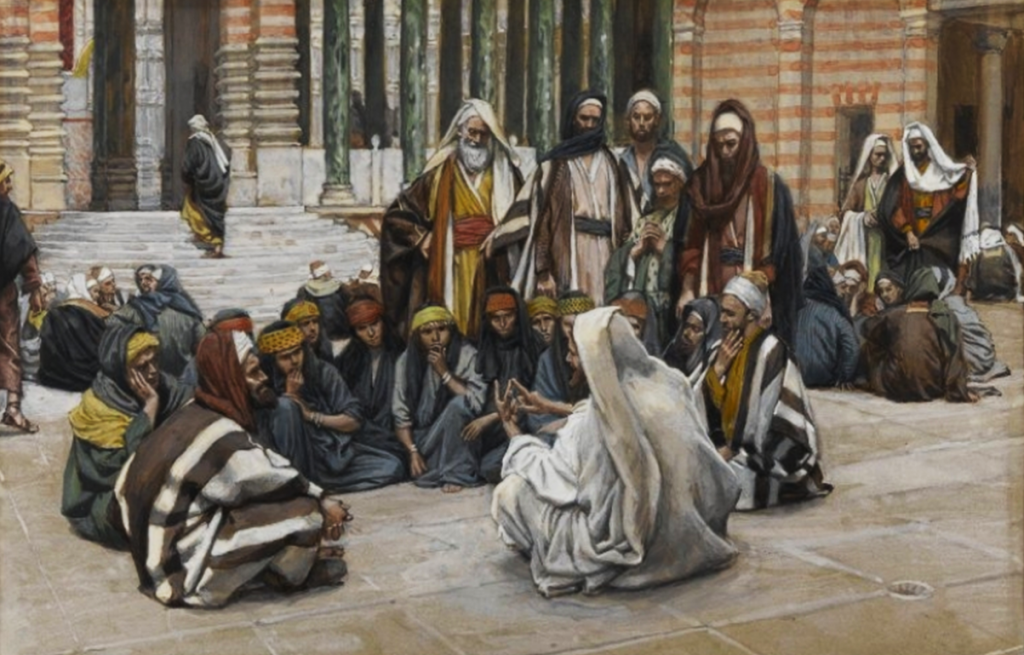 08.04.00.A. JESUS SPEAKS NEAR THE TREASURY by James Tossit. Jesus spoke on the spiritual treasures of the Kingdom of God while near the temple treasury where many kept their personal funds.
08.04.00.A. JESUS SPEAKS NEAR THE TREASURY by James Tossit. Jesus spoke on the spiritual treasures of the Kingdom of God while near the temple treasury where many kept their personal funds.
Unit 08
Topical Issues
Chapter 04
Concerns Of This Life
 08.04.00.A. JESUS SPEAKS NEAR THE TREASURY by James Tossit. Jesus spoke on the spiritual treasures of the Kingdom of God while near the temple treasury where many kept their personal funds.
08.04.00.A. JESUS SPEAKS NEAR THE TREASURY by James Tossit. Jesus spoke on the spiritual treasures of the Kingdom of God while near the temple treasury where many kept their personal funds.
08.04.01 Mt. 6:19-24
SPIRITUAL TREASURES
19 Don’t collect for yourselves treasures on earth,
where moth and rust destroy,
and where thieves break in and steal.
20 But store up for yourselves treasures in heaven,
where neither moth and rust destroys,
and where thieves don’t break in and steal.
21 For where your treasure is,
there your heart will be also.
22 “The eye is the lamp of the body.
If your eye is good,
your whole body will be full of light.
23 But if your eye is bad,
your whole body will be full of darkness.
So if the light within you is darkness—
how deep is that darkness?
If then the light within you
is darkness,
how great is that darkness!
24 “No one can be a slave of two masters.
Since either he will hate the one
and love the other,
or be devoted to one
and despise the other.
You cannot be slaves of God and of money.
At this time there was no institutionalized banking system, although there is clear evidence that the aristocrats and super rich stored their wealth in the temple.[1] But for most people, what little they had was hidden somewhere in their home or possibly buried in a field. Since houses were generally constructed of stone, and sometimes of brick depending upon location, thieves could literally dig their way into a house.
“Moth and rust destroy.” The Greek term for rust is brosis (1111) and it literally means to eat away. Therefore, the word “moth” and “rust” are parallelisms to emphasize the futility of earthly wealth. Preventing loss was a major concern because these objects of value were easily stolen or subject to deterioration.[2] Preserving wealth often became an obsession, which is why the Apostle Paul warned about getting engrossed with it (1 Cor. 7:31; 1 Tim. 6:9). In fact, all of the disciples had divorced themselves from material passions, something that was most certainly difficult in a peasant-slave culture under Roman oppression (Philip. 4:11-14).
“Eye is good … eye is bad.” This idiom of the eyes was popular in all ancient Middle Eastern cultures and a modified version continues on today. The phrase, good eye, from the Hebrew aiyin tovah [3] or Greek haplous, meant one was sound, kind, giving and generous,[4] but today it has the meaning of good luck or good fortune. On the other hand, the phrase bad eye, (Heb. aiyin ra’ah) meant that one was jealous and greedy; [5] although the phrase has been changed to mean evil eye.[6]
“So if the light within you is darkness—how deep is that darkness?” How can light (Gk. phos) be darkness (Gk. skotos)?[7] This statement is one of several oxymorons[8] used in Scripture. It is intended to combine words that are naturally opposite, but, when used in this manner, they enhance the meaning of the speaker. In this case, if a small amount of light is considered to be darkness, how much more darkness would there be if there was absolutely no light whatsoever?
“You cannot be slaves of God and of money.” The word money in a general Aramaic or Hebrew sense means wealth. And the passion to obtain wealth often commanded and possessed a man’s allegiance and, thus, became his god. When he finally has financial security, he seldom needs divine security, and has no need to trust God for his daily provisions. Therefore, he cannot serve both God and his financial security. Jesus was often quick to condemn those who had great wealth, not because they were wealthy, but because He knew that their wealth was their security – a substitute for God Himself. The proper use of wealth is to help expand the Kingdom of God. Finally, Jesus was not alone in this comment as some Old Testament prophets[9] made similar statements as did some rabbis in later Judaism[10] and in the Dead Sea Scrolls.[11]
[1]. 4 Maccabees 4.3; Josephus, Wars 6.5.2 (282); See also banking discussion in 05.05.04.
[2]. Carson, “Matthew” 8:177.
[3]. Moseley, Yeshua: A Guide to the Real Jesus and the Original Church. 29.
[4]. Lang, Know the Words of Jesus. 224; Bock, Jesus According to Scripture. 142-43.
[5]. Bock, Jesus According to Scripture. 221.
[6]. Moseley, Yeshua: A Guide to the Real Jesus and the Original Church. 28-29; See Lk. 11:34; 09.02.01; 12.03.10.
[7]. Barclay, Jesus. 264.
[8]. Bullinger, Figures of Speech Used in the Bible. 816-18; See Appendix 26 for definition.
[9]. Amos 5:10-12; Isa. 1:22-23; 5:8-10.
[10]. 1 Enoch 92-105.
[11]. Safrai and Flusser. “The Slave of Two Masters.” 32; 1 QS 3:19-22.
08.04.02 Mt. 6:25-34
AVOIDING ANXIETY
25 “This is why I tell you: Don’t worry about your life, what you will eat or what you will drink; or about your body, what you will wear. Isn’t life more than food and the body more than clothing? 26 Look at the birds of the sky: They don’t sow or reap or gather into barns, yet your heavenly Father feeds them. Aren’t you worth more than they? 27 Can any of you add a single cubit to his height by worrying?
28 And why do you worry about clothes? Learn how the wildflowers of the field grow: they don’t labor or spin thread. 29 Yet I tell you that not even Solomon in all his splendor was adorned like one of these! 30 If that’s how God clothes the grass of the field, which is here today and thrown into the furnace tomorrow, won’t He do much more for you — you of little faith? 31 So don’t worry, saying, ‘What will we eat?’ or ‘What will we drink?’ or ‘What will we wear?’
32 For the idolaters eagerly seek all these things, and your heavenly Father knows that you need them. 33 But seek first the kingdom of God and His righteousness, and all these things will be provided for you. 34 Therefore don’t worry about tomorrow, because tomorrow will worry about itself. Each day has enough trouble of its own.
There are certain key words and phrases that stand out in the gospels. One of them is “pray,” because Jesus often went somewhere to be alone to pray. Another is the term “don’t worry.” This term not only suggests His strength and poise that is to be within the believer, but is also an encouragement of faith. Over and over again Jesus told His disciples not to worry as there is only one supreme concern and that is the issues of the Spirit. It is a step of spiritual maturity when one can stop worrying and face challenges in faith. That does not negate honest concern about an issue, but the crippling effect of worry reflects lack of faith in God. The next step in maturity is to seek first the Kingdom of God (Mt. 6:33), that is, to pray about and accomplish the tasks assigned in building the Kingdom of God.
“Don’t worry about your life.” These words must have sounded like some kind of humor because was explosive tension between the Romans and Jews. In the midst of Roman occupation, high taxation, and economic stress, Jesus commented on the essential elements of life, which God continues to provide for His own. The Jews, and especially Jesus, were constantly under the watchful eye of the Romans, as well as the Herodian spies. In this explosive social setting, Jesus essentially said, “Do not worry about your life, God will take care of you.” The concept is simply an extension of His words on the fulfillment of the Law (Mt. 5:1-48; cf. 6:19, 24), where phrases such as “lay up treasures in heaven” and “serve God,” are in close context with this teaching.
On the other hand, this statement does not negate the curse of being lazy, apathetic, or indifferent. It means that believers ought to focus their faith in and devotion to God, while working toward the necessities of life and family. Neither does it mean that one should not plan for the future. Noah planned to build a boat, but did not worry about it even when under tremendous social pressure and ridicule. The Apostle Paul planned mission trips, but did not worry about his travels. Likewise, we are to make godly plans, but are not to worry about them. Being overly concerned for one’s welfare was not unique to the time of Jesus. One of the early church fathers made this comment about the attention given to the physical bodies at the expense of godly matters:
There are many people who exert greater care for their bodies than they do for their soul. But they should devote a greater solicitude for their souls, where the image of God is. When the flesh, which they love so much, begins to be devoured by worms in the grave, the soul is presented to God by the angels in heaven.
Caesar of Arles, Sermons[1]
“Look at the birds of the sky.” Here the Master Teacher connected His teaching with the bountiful beauty of nature. The Holy Land lies between the Mediterranean Sea on the west and what was then known as the northern part of the Arabian Desert (today’s Jordan) on the east. It is the land bridge that connects the continents of Africa, Europe and Asia. This small parcel of fertile land is in the flight path of one-third of all migratory birds, an estimated five hundred million that fly over it every March and again every November as they migrate from one continent to another.[2] This phrase was an excellent illustration of the love and care of God.
“Cubit.” A cubit is a distance measurement, but here Jesus used it as a figure of speech concerning time.
“The wildflowers of the field.” Only Switzerland has more natural wildflowers than Israel. Israel’s beauty is phenomenal by the time the winter rains end, but by late April and early May the hot, dry sirocco winds from the eastern desert dry them up quickly.[3] The withered plants were harvested and used for fuel in home cooking and pottery kilns (cf. Ps. 103 and Isa. 40).

08.04.02.A. WILD FLOWERS OF ISRAEL. Israel has more wild flowers than any other nation except Switzerland. About the time the winter rains end and temperatures rise (March and April) the plains and mountain regions are a carpet of wild flowers. Photograph by the author.

08.04.02.B. A TYPICAL CLAY OVEN. A clay oven, known as a tabun, such as this one is barely 24 inches high. It was used daily for basic “baking” pizza-shaped bread, which was laid upon its outer surface to bake. Fuel was anything that would burn, although dried grass and manure was the most common fuel. Notice the hanging frying pan, a rare item in the first century. Photograph by the author.
“Solomon in all his splendor.” The extreme wealth and power of King Solomon was proverbial.[4] People spoke of him as they did of his legendary father King David and the great international empire he established. The conclusion of this passage is that one’s life is to be focused on God in all daily activities (Mt. 6:33). These words were probably applauded by the Essenes who devoted themselves to every commandment of the Law of Moses,[5] but Jesus emphasized this with kindness and love.
[1]. Thomas, The Golden Treasury of Patristic Quotations: From 50 – 750 A.D. 262; Note: the term “Caesar” was a family name, but it became the title of the emperor who had the same family name. This Caesar was not affiliated with the Roman monarchy.
[2]. Horovitz, “Starling Express.” 5.
[3]. Levy, The Ruin and Restoration of Israel. 89.
[4]. 1 Kg. 3:12-13; 4:21-34; 2 Ch. 9:13-28.
[5]. Dead Sea Scroll 1QS 1:1-2; 5:8-11.
08.04.03 Lk. 6:37-42 (See also Mt. 7:1-5)
HYPOCRITICAL JUDGING
37 “Do not judge,
and you will not be judged.
Do not condemn,
and you will not be condemned.
Forgive,
and you will be forgiven.
38 Give,
and it will be given to you;
A good measure –
pressed down,
shaken together
and running over –
will be poured into your lap.
For with the measure you use,
it will be measured back to you.
39 He also told them a parable: “Can the blind guide the blind? Won’t they both fall into a pit? 40 A disciple is not above his teacher, but everyone who is fully trained will be like his teacher.
41 “Why do you look at the speck in your brother’s eye, but don’t notice the log in your own eye? 42 Or how can you say to your brother, ‘Brother, let me take out the speck that is in your eye,’ when you yourself don’t see the log in your eye? Hypocrite! First take the log out of your eye, and then you will see clearly to take out the speck in your brother’s eye.
08.04.03.Q1 Are we to judge or not to judge others (Mt. 7:1 vs. 1 Cor. 5:12, etc)?
Matthew 7:1 and Luke 6:37 clearly say “do not judge,” but other passages such as 1 Corinthians 5:12) indicate otherwise. By definition, the phrase judge (Gk. katadikazete) as found in Matthew and Luke refer to sharp unjust criticism[1] but could also be rendered as condemn not.[2] Since all of humanity is a fallen race, no one has the right to condemn another or to be a “faultfinder.” In fact, God will either judge us or have mercy on us, depending on how we either judge or have mercy on others. The Hebraic poetry in this passage sets the parameters of the meaning of the word. The meaning is restricted to this use and does not have reference to discernment or general decisions that need to be made in human affairs.[3] Jesus did not forbid the discernment between truth and error in doctrine or in the life of another, but He meant that one should not judge others self-righteously or condemningly (cf Mt. 23:13-39; Rom. 2:1). In addition, Scripture as a whole directs believers to carefully discern false or real prophets, as well as the fruitfulness of others. Based on careful judgment (meaning discernment), there are several situations were judgment is commanded:
Persons who reflect one or more of these and other characteristics or behaviors are to be avoided and, in some cases, they are to be excommunicated from the local church. This type of judgment or discernment was not what Jesus taught in this passage. He was specifically speaking of unjust criticism. Scriptures provides these considerations:
Yet care must be taken because one does not always understand all the events that occurred in another’s life. That is why the famous Rabbi Hillel once said,
Do not judge your brother until you have come to his place.
Mishnah, Aboth 2.4
Furthermore, there are two important phrases that are to be considered: “Give and it will be given to you.” This passage is frequently used in terms of tithing to the church. However, note that the context is a discussion on forgiveness, not tithing. Jesus said if we forgive much, He will forgive us abundantly. This same principle of giving forgiveness can be applied to other areas of life such as giving tithes, offerings, and alms. The second phrase suggests that divine forgiveness “will be poured into your lap.” Men’s clothing at the time were loose like women’s dresses are today. Since a belt was worn around the waist, the garment could be folded to create a large front pocket that could be used to carry a huge amount of goods, such as grain. The blessing of God that would be “running over,” is potentially far more than what could have been placed on one’s lap or pocket.
Concerning proper judgments, Jesus made an exaggeration when He said, “First, take the log out of your eye.” The phrase is a hyperbole, a ridiculous contrast, a statement of over-emphasis involving a word play of “speck” and “log/plank”[5] to dramatize a point. In essence, Jesus said that we should take a tree or large piece of timber out of our own eye before taking a toothpick or splinter out of the eye of another, meaning that before attempting to help someone else, one had to clean up his own life. No one has the right to judge another’s conduct or motive until his own life has been cleaned up, then righteous men and women are to use discernment in their judgments of others. Therefore, there are times when judgments according to divine principles are in order.
[1]. Robertson, Word Pictures in the New Testament. 60.
[2]. Lang, Know the Words of Jesus. 159.
[3]. Liefeld, “Luke.” 8:895.
[4]. See the discussion on hypocrites/hypocrisy in 08.03.04 (Mt. :5-15) and in “Pharisees” in 02.01.14.
[5]. Liefeld, “Luke.” 8:895.
08.04.04 Mt. 7:6
INAPPROPRIATE CONCERN
6 Don’t give what is holy to dogs
Or toss your pearls before pigs,
Or they will trample them with their feet,
turn, and tear you to pieces.
“Don’t give what is holy to dogs.” The word dog was a degrading term used by Jews when speaking of a non-Jewish person.[1] Today the phrase, “going to the dogs” meaning, “to ruin” comes from this phrase. But more degrading than the word “dog,” was an association with pigs. The Jews considered pigs the most unclean animal and on their list of forbidden foods.[2] What is sacred is, of course, of great value and in this parable is compared to the high value of pearls. The poetic parallel form is obvious. The analogy is that the good things of God should not be taken lightly.
The problem with this verse is that it appears to demand a level of exclusiveness even though Jesus is the Savior for everyone. The early church interpreted it in two ways.
In the decades following the ascension of Jesus, there was severe persecution of Christians. Because of this and the loss of key leaders to martyrdom, pastors were forced to
Matthew 7:6 quickly became a significant guidepost for admitting some and prohibiting others from attending the Lord’s Table, that is, the Eucharist. As church growth exploded, many false teachers entered various congregations and caused chaos and confusion. Tertullian complained that popular false teachers and heretics permitted everyone to our Lord’s Table, similar to “Open Communion” practiced by many churches today. He said,
That which is holy they will cast to the dogs, and pearls to swine.
Tertullian, De Praescriptione 41
The early church not only underscored the exclusiveness of our Lord’s Table, but also made a reference to Matthew 7:6 as follows.
Let no one eat and drink from your Eucharist but those baptized in the name of the Lord: to this, too, the saying of the Lord is applicable, “Do not give to dogs what is sacred.”
Didache 9:5
The gospel message was available to everyone. However, to become a part of the inner circle of believers and partake of the Communion Table, one had to show evidence of a changed and consecrated life. It has been said that the challenges that the first century faced immediately after the ascension will be the same immediately before He returns. If so, then church leaders today may need to re-evaluate their open communion policies.
[1]. Ex. 22:31; 1 Kings 21:23; Ps. 22:16, 20; 59:14; 68:23; Jer. 15:3; Mt. 15:26-27; Mk. 7:27-28; Lk. 16:21; Phil. 3:2; Rev. 22:15.
[2]. Lev. 11:7; Isa. 65:4; 66:3, 17; Lk. 15:15-16.
[3]. This practice by pastors continues today in many areas of the world where believers are persecuted and martyred.
08.04.05 Mt. 7:7-12
PERSISTENCE OF PRAYER
7 “Keep asking
and it will be given to you;
keep searching
and you will find;
keep knocking,
and the door will be opened to you
8 For everyone who asks
receives,
and the one who searches
finds,
and to the one who knocks,
the door will be opened.
9 What man among you, if his son asks him for bread,
will give him a stone?
10 Or if he asks for a fish,
he give him a snake?
11 If you then, who are evil,
know how to give good gifts to your children,
how much more will your Father in heaven
give good gifts to those who ask him!
12 Therefore, whatever you want others to do for you, do also the same for them — this is the Law and the Prophets.
“If his son asks him for bread, will give him a stone? 10 Or if he asks for a fish, will give him a snake?” The point of the message is that a father would never give his son a stone or snake when he needs food. Likewise the Father in heaven would never give His children anything that would hurt them, but desires to give only the best.
In ancient times, bread was not baked in oblong pans that formed thick loaves, as is done today in the West. Some have mistakenly said loaves were in the same shape as stones and, therefore, Jesus made a visual connection. Yet this author has traveled all over Israel and never found an example of this proposed similarity. Residents of Israel agree that stones simply do not look like the thin pancake-shaped loaves of bread.

08.04.05.A. TRADITIONAL BREAD. Many bake shops in Jerusalem and other communities today bake bread as was done in biblical times. The bread is similar to a pancake and is laid on the flat surface of the oven, hot rock, or today, on the outer edge of a 55-gallon steel drum. Photograph by the author.
Once when teaching in Israel, one of the author’s students informed him that rocks were first placed in an open fire to be heated. They were then removed and the flat dough was spread over the stones to bake. The student also showed the author a gas-fired oven lined with rocks. Thin batches of dough were placed on the pre-heated rocks clearly demonstrating that the old tradition was adapted to the 21st century.
When Jesus was teaching along the shore of the Sea of Galilee, He was near the small fishing village of Tabgha. A short distance into the water are seven hot springs that is favorite habitat area for fish and snakes during the colder winter months.[1] This figure of speech was used because snakes occasionally were caught in the nets of fishermen. This was mentioned by the visiting Spanish Pilgrim Egeria (c. 383) and by Theodosius (c. 530).[2]
Here, and again in Matthew 22:39, Jesus made an appeal to believers to ask their heavenly Father for what they need, and He will provide. Likewise, we are to treat others in the same manner as we desire to be treated ourselves. It rephrases what Moses said fifteen centuries earlier.
Do not take revenge or bear a grudge against members of your community, but love your neighbor as yourself; I am Yahweh.
Leviticus 19:18
Divine instructions for life have been in existence since Adam and Eve. That is why Abraham gave a tithe long before Moses wrote of the commandment concerning tithes. That is also why some basic principles of life in Judaism and Christianity (i.e. marriage = 1 man +1 woman) are found in other religions. The Golden Rule (Matthew 7:12) is found in negative form in Hinduism, Buddhism, and Confucianism, as well as in the rabbinic writings. Variations have also been found in Greek and Roman ethical teachings. This suggests two things:
Almost two centuries before Christ, a Jewish scribe by the name of Jesus, son of Sirach, wrote a text known as Ben Sirach, a/k/a Ecclesiasticus. This extra-biblical book has an interesting reflection on the writings of Moses. The following words indicate that at least some Jews were close to understanding the principles of the Kingdom of God before Jesus came:
Forgive your neighbor the wrong he has done,
and your sins will be pardoned when you pray.
Does anyone harbor anger against another,
And expect healing from the Lord?
If one has no mercy toward another like himself,
Can he then seek pardon for his own sins?
Ben Sirach 28:2-4
Many Jews had already put into practice what Jesus was teaching before He came. One Jewish scholar, David Flusser of Hebrew University in Jerusalem, went so far as to say that, “From ancient Jewish writings, we could easily construct a whole Gospel without using a single word that originated with Jesus. This could only be done, however, because we do, in fact, possess the Gospels.”[3]
“If you then, who are evil.” This is a general statement meaning that all men are sinners. The sinful nature of people does not mean they do not love their children and want to care for them. So how much more does God the Father care for His children? Jeremiah said that humanity was lost, deceitful, and wicked (Jer. 17:9), but God sent Jesus that people would not be condemned, but would be saved (Jn. 3:16). This is foundational to understanding the Christian faith.
“Whatever you want others to do for you, do also the same for them.” Again, the teachings of Jesus were reflected by some leading rabbis who had an accurate perception that the Law was not to legalize or restrict, but to point the way the heart should be guided. Two rabbis made these comments that are incredibly similar to Matthew 7:12. Rabbi Eliezer said,
Let the honor of your own fellow man be as dear to you as your own.
Mishnah, Aboth 2:10
And Rabbi Yose said,
Let the possessions of your fellow man be as dear to you as your own.
Mishnah, Aboth 2:12
“This is the Law and the Prophets.” Verse 12 is a summary statement. Jesus again clarified that He did not come to replace the Old Testament, but to fulfill it. He did not replace the Law per se, but instructed His disciples to fulfill the intent of the Law. The intent of the Law, as well as understanding the character of God, is explained in the following manner:
Obeying the Old Testament Law = shallow understanding
Obeying the Old Testament Law with grace = deeper understanding
To say that the Old Testament is invalid is correct only in terms of the sacrificial system, as Jesus replaced that system with His body at Calvary. It is significant that all other portions are to be honored as reflected in obedience. On an important side note, it is unfortunate that the Church has adopted a Roman view of Law, that means restriction and is therefore, bad, but fails to see that the Hebrew Bible views Law as instruction and freedom, and is therefore, good.[4]
An encounter was recorded between Rabbi Hillel and Rabbi Shammai both of whom lived just prior to the birth of Jesus and during His young manhood. The story is that of a pagan who asked both scholars to teach him the core issue of the Torah. Their responses reflect an interesting insight of their character and belief system.
A pagan came before Shammai and said to him, “Make me a proselyte, but on the condition that you teach me the entire Torah while I am standing on one foot!” Shammai drove him off with the builder’s measuring rod which he had in his hand. When he (the pagan) appeared before Hillel, the latter told him, “What is hateful to you, do not to your neighbor. That is the whole Torah, while the rest is commentary; go and learn.”
Babylonian Talmud, Shabbath 30b[5]
Many of the teachings of Jesus confirmed what righteous Jews already knew. Those who opposed Him did so on the grounds that they held the Oral Law in a position superior to the Hebrew Bible. Likewise, they refused to recognize Him as their Messiah.
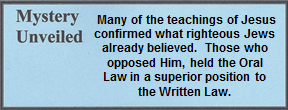
[1]. The Jordan River Valley is dotted with locations where hot springs still exist. The most popular for tourists today are the hot springs resort in Tiberius and the family park of the Hamat Gader Roman Baths at the southeast end of the Sea of Galilee.
[2]. Kane, “Capernaum.” 1:246.
[3]. Flusser, Jesus. 90.
[4]. See video 08.01.06.V by Messianic Rabbi John Fischer who discusses the term “light and heavy” elements of the Mosaic instruction from a first century Jewish perspective. He makes a comment about the definition of “Torah” as it means “guidance” or “instruction,” rather than “law.”
[5]. See also Babylonian Talmud, Shabbath 31a; cf. Didache 1:2.
08.04.06 Mt. 7:13-14
NARROW AND WIDE GATES OF LIFE
13 “Enter through the narrow gate.
For the gate is wide and
The road is broad that leads to destruction,
and there are many who go through it.
14 How narrow is the gate and
difficult the road that leads to life,
and few find it.
The idea that the first would be last is the direct opposite of Jewish thought.[1] Jesus again speaks to the Jewish people about their prevailing belief that just because they were descendants of Abraham, all would inherit heaven.[2] This doctrine was promoted by the Pharisees who taught that all Jews would enjoy eternity with God and all Gentiles would be damned to hell – but Jesus clearly disagreed.
The metaphors “the gate” and “the road” are reflective of the decisions of life. Jesus spoke of the lifestyle that is grounded in His Word and compared it to the popular Hellenistic ideas and philosophies. The Hellenism of the first century was no different than the humanism of today. There are still two destinies from which one must choose; one leads to life and the other to destruction (Gk. phthora).[3] In essence, decisions determine destiny. The Hebrew Bible has some definite directives on making the right decisions concerning worship and obedience to God.
Furthermore, Jewish literature, and especially poetry, was abundant in contrasting ideas because it was an integral part of the first century Jewish thought process. Themes such as “light” and “darkness,” or “wise men” and “foolish men” are found throughout both Testaments, extra-canonical books, and the Dead Sea Scrolls. A few of many examples are,
These writings demonstrate that from Moses to Jesus, there were always those who were concerned with making godly decisions in life. An example from the second century B.C. era is the words of Jesus ben Sirach who said,
“The way of sinners (as) smoothly paved with stones but at its end is the pit of Hades.”
Ben Sirach 21:10
But the essential message is that most people will choose not to follow God and go the popular route; few will chose the road less traveled that leads to eternal life.[4] Jesus understood very well that decisions determined destiny.
[1]. 1QSa 2.11-12; 1 Enoch 62:14; 2 Enoch 45:2; 2 Baruch 30:4; Mishnah Aboth 3.17.
[2]. Fruchtenbaum, The Jewish Foundation of the Life of Messiah: Instructor’s Manual. Class 17, page 12.
[3]. Barclay, Jesus. 264.
[4]. Lang, Know the Words of Jesus. 225.
08.04.07 Mt. 7:15-20; Lk. 6:45; Mt. 7:21-23
TESTING RELIGIOUS LEADERS
Mt. 15 “Beware of false prophets who come to you in sheep’s clothing but inwardly are ravaging wolves. 16 You’ll recognize them by their fruit.
Are grapes gathered
from thorn bushes,
or figs
from thistles?
17 In the same way, every good tree
produces good fruit,
but a bad tree
produces bad fruit.
18 A good tree can’t
produce bad fruit;
neither can a bad tree
produce good fruit.
19 Every tree that doesn’t
Produce good fruit is cut down and thrown into the fire.
20 So you’ll recognize them by their fruit.
Lk. 45 A good man produces good out of the good storeroom of his heart. An evil man produces evil out of the evil storeroom, for his mouth speaks from the overflow of the heart.
Mt. 21 “Not everyone who says to Me, ‘Lord, Lord!’ will enter the kingdom of heaven, but only the one who does the will of My Father in heaven. 22 On that day many will say to Me, ‘Lord, Lord, didn’t we prophesy in Your name, drive out demons in Your name, and do many miracles in Your name?’ 23 Then I will announce to them, ‘I never knew you! Depart from Me, you lawbreakers!’
“False prophets.” Throughout biblical history there were always warnings of false prophets and their related deceptions, such as Balaam who functioned only for personal gain. When Jesus preached His Olivet Discourse (Mt. 24) and described the events that would occur near the end of the age, His first warning was to be aware of deceptions.[1] This was especially needed due to the number of deceptive writings and doctrines of Inter-Testamental and Post-New Testament Periods that became popular and have continued ever since then.[2]
“Only the one who does the will of My Father in heaven.” Many of the words spoken by Jesus were common knowledge.[3] An example of a Jewish saying is below.
Do His will (the will of God) as if it was your will that He may do your will as if it was His will. Make your will of none effect before his will, that He may make the will of others of none effect before your will.
Mishnah, Aboth 2.4
Jesus was generally in agreement with the theology of the Pharisees, but not with how they lived their lives. He was concerned with the corrupt religious elite and the theological confusion that had established itself with the influx of Hellenism.
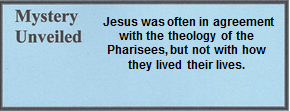
“Lord, Lord, didn’t we prophesy in Your name, drive out demons in Your name, and do many miracles in Your name?” This passage has been among the most controversial ones throughout the centuries. The primary point of difficulty is that someone who professed to exercise the power of Jesus is unknown to Him. Exorcists often called upon the names of several deities for combined supernatural powers to cast out a demon or demons. After the ministry of Jesus, some used His name for various healings and exorcisms.
Archaeologists uncovered two important documents that bring clarification to this issue. The first is an exorcism invoking the names of King Solomon and Yahweh against Belial and the liliths (devils). Solomon was mentioned because Scripture reported him to be the wisest of all men and had the gift of discernment. By the first century, supernatural powers were attributed to him as well.
[Text missing] of David. Concerning the words of the spell in the name of YHWH [text missing] of Solomon, and he will invoke the name of YHWH to set him free from every affliction of the spirits, of the devils, liliths, owls and jackals. These are the devils, and the prince of enmity is Belial who rules over the abyss of darkness [text missing] to [text missing] and to magnify the God of wonders… the sons of his people have completed the cure [text missing] those who have relied on your name. Invoke [text missing] guarding of Israel. Lean on YHWH, the God of gods, he who made the heavens, and the earth and all that is in them, who separated light from darkness.
Dead Sea Scroll, Apocryphal Psalm of Exorcism (11Q11 [11QPsApa]), 1:1-13[4]
The second example is a third century A.D. document found in Egypt that was written by a Jew who called upon more deities than God alone. A large portion of the text was omitted, in which the spirits were repeatedly adjured. It should be noted that the words “I adjure you” is a command that means “to cast out.” The abbreviated form is as follows,
For those possessed by demons, [here is] an approved charm by Pibechis. Take oil made of unripe olives, together with the plant Mastigia and lotus pith, and boil it with marjoram (very colorless), Saying, “Joel, Ossarthiomi, Emori[5]...Come out of such-a-one.”[6] But write on the phylactery… “Jaeo, Abraothioch, Phtha[7] …and hang it around the sufferer: it is of every demon a thing to be trembled at,[8] which he fears. Standing opposite, adjure him. The adjuration is this: “I adjure you[9] by the god of the Hebrews Jesu,[10] Jaba…you that appear in fire, you that are in the midst of the earth and snow and vapor, tannetis: let your angel descend, implacable one, and let him draw into captivity the demon as he flies around this creature which God formed in his holy paradise.” (continued below)
The magical formula closes with the following:
I adjure you by him who appeared unto you O Israel in the pillar of light and in the cloud by day, and delivered his word from the task work of Pharaoh and brought upon Pharaoh the ten plagues because he did not listen. I adjure you, every demonic spirit, whoever you are…I adjure you by God the light-bringer, invincible, who knows what is in the heart of all life, who from dust formed the race of men… I adjure you by the great God Sabaoth through whom the Jordan River flowed backward, the Red Sea also, which Israel journeyed over and it was impassable.
I adjure you — every demonic spirit — by Him that looks down on the earth and makes the foundations tremble thereof, and made all things out of things which were not into being. But I adjure you, you who see the adjuration: the flesh of swine you must not eat, and there shall be subject to you every spirit and demon, whatever he may be. But when you adjurest, blow sending [your] breath from above [to the feet], and from the feet to the face, and he [the demon] will be drawn into captivity. Be pure and keep it. For the sentence is Hebrew and kept by men that are pure.
Paris Magical Papyrus of Jewish Origins, Selections from lines 3,007-85[11]
“I never knew you.” This profound statement is not one of an academic or casual knowledge, but the word “knew” refers to the knowledge of personal experience, as in a close personal friendship.[12] The phrase had specific reference to those who were not committed to Him, persons who did not have a relationship with Jesus yet demonstrated incredible signs and wonders, possibly by demonic powers.
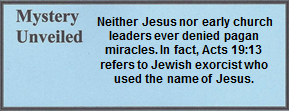
There is a theme of obedience in both the Old and New Testament; that is to claim that if one knows and loves God, he must be obedient to Him. This was expressed by Luke when he said why do you call me Lord, Lord and do not do what you are told to do (Lk. 6:46). The image of a disciple was one who patterned his life after his rabbi and mentor. Disciples of Jesus today must pattern their lives after Rabbi Jesus. Those who chose not to live like Him or obey Him are unbelievers and false teachers. That is why the prophet Isaiah said that the people speak well of God but their hearts are far from Him (Isa. 29:13).
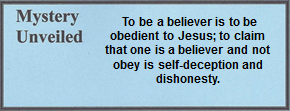
08.04.07.Q1 What verbal formulas did exorcists use when casting out demons?
It is not the intent to teach demonic formulas or ancient witchcraft,[13] but rather, to present evidence to show that exorcists who worshiped other gods (demons) also called upon the name of God and/or Jesus.[14] As previously stated, the typical prayers of exorcism used by the Jews and Greeks had essentially the same elements.
Jesus, in contrast, simply commanded the demons to leave their victim. His disciples were told to do the same, but to add the authoritative phrase, “in the name of Jesus” (Mt. 10:1; Lk. 10:19).[16] The command “come out” is the same word used by Jesus in Luke 4:35 (cf. Mk. 1:25, 5:8, 9:25) and was a common formula used in exorcisms. The word “Phtha” was the name of an Egyptian god. The term “adjure” is a formula to command a spirit to act and the name “Jesu” is the abbreviated name of Jesus, the power source used to cast out the demon. Jews had a high regard for the name of God. Even today many will spell the name of Deity as “G-d.” Likewise any Jew who considered the deity of Jesus spelled His name “Yeshua” in Hebrew or “Jesu” in Greek. It appears that some Jewish exorcists who did not believe in the divinity of Jesus still used His name to perform exorcisms because Jesus had literally cast demons out of people – something the Jewish leaders never denied.
Another column of the same scroll repeats the theme of communicating a command, in the name of God, (Heb. “YHWH”) to a spirit.
1 [text missing] 2 which [text missing] 3 the volunteers of your tr[uth, when Ra]phael heals them. 4 Of David. Con[cerning the words of the spe]ll in the name of YHWH. [Call on] 5 the heavens [at a]ny time. [When] Beli[al comes upon you, [you] shall say to him: 6 “Who are you, [accursed amongst] men and amongst the seed of the holy ones? Your face is a face 7 of futility, and your horns are horns of a wre[tch]. You are darkness and not light, 8 [s]in and not justice. [Against you,] the chief of the army, YHWH will [shut] you 9 [in the] deepest She[ol], he will shut] the two bronze gates through which no 10 light [penetrates.] [On you there shall] not [shine the light of the] sun, which [rises] 11 [upon the] just man [to illuminate his face.]” You shall say to him; “Is there not perhaps [an angel] 12 with the just man, to go [to judgment when] Sa[tan] mistreats him?” [And he will be freed] from dark[ness by] 13 [the spirit of tru]th, [because jus]tice is with him [to uphold him at the judgment. 14 [text missing] not [text missing].
Dead Sea Scroll, Apocryphal Psalm of Exorcism (11Q11[11QPsApa]), 4:1-14[17]
These manuscripts clearly indicate that first century Jews had a functional knowledge of using the name and authority of God to cast out demons. In the beginning of the third century, in Egypt, the following lengthy text was written by a Jew who called upon more than the God of his forefathers. A large portion of the text was omitted wherein where the spirits were repeatedly called upon.
Between the first and fourth centuries A.D. the works of several Christian writers were collected and became known as the Apocalypse of Elijah.[18] The authors were evidently familiar with the New Testament writings as they used phrases (2:41; 3:1) such as “man of lawlessness” a common motif in 2 Thessalonians while 4:13ff appears to be dependent upon Revelation 11:8ff. Interestingly, in the third chapter are the works of the antichrist which essentially replicate all the works that Christ did with the exception of raising the dead to life.[19] Clearly, since these miracles include healings and exorcisms, the authority of loosening and binding was not only a legislative matter, but also applied to the spiritual realm. There are two distinct methods of interpreting the term “binding and loosening,” [20] and scholars continue to debate these terms today.[21]
Video Insert >
08.04.07.V The Conflicting Views on “Binding and Loosening.” Drs. Joe Wehrer and David Clark discuss their understanding of this important phrase. Introduction by Dr. Bill Heinrich. ()
So at this point, notice that Matthew 7:22 refers to individuals who functioned with the power of binding and loosening, yet were not permitted to enter heaven. The passage reads, “Lord, Lord, didn’t we prophesy in Your name, drive out demons in Your name, and do many miracles in Your name?’ The response from the Savior will be “I never knew you.” At issue is the fact that a personal relationship with Jesus is required, and this is certainly more important than having the ability to cast out demons. Yet those who perform exorcisms in the name of Jesus consistently state that a close relationship with Christ is essential in this kind of ministry. One of the earliest church fathers who acknowledged this divine power was Justin Martyr, who lived in Samaria about a century after Jesus. He stated that,
We [are] believers in Jesus our Lord, who was crucified under Pontius Pilate, cast out all devils and other evil spirits and thus have them in our power.
Justin Martyr, Dialogue with Trypho 6:269
In the early third century, Tertullian constantly and aggressively attacked pagan philosophies and their accompanying lifestyles. In stark contrast, he spoke of the joys of being a follower of Christ and stated that as a Christian, what could be better…
Than to find yourself trampling underfoot the gods of the Gentiles, expelling demons, effecting cures, seeking revelations, living to God? These are the pleasures, the spectacles of Christians, holy, eternal, and freed.
Tertullian, De Spectaculis 29[23]
Origen was another church father of the early third century who recorded the signs and wonders of the Holy Spirit in the lives of Christians. In one of his apologetic writings he stated,
By these [the names of God and Jesus] we also have seen many delivered from serious ailments, and from mental distractions and madness, and countless other diseases, which neither men nor demons had cured.
Origen, Against Celsus 3.24
Clement of Alexandria was one who warned against such use of demonic powers. He said this:
Against whom does Heracleitus of Ephesus utter this prophecy? Against night-roamers, magicians, Bacchants, Lenaean revelers and devotees of the mysteries.
Clement of Alexandria, Exhortation 2.19[24]
The Roman-Greco world believed the spirit world had an overriding influence on every aspect of men. Therefore, when one prayed, he commanded the gods to a particular action and, of course, expected the requested results.[25] In his letters to the Ephesian and Colossian churches, the Apostle Paul referred to the power of Jesus being victorious over demonic powers.[26] It was normal to expect results from prayers and exorcisms.
A Lesson in First Century Hermeneutics:
08.04.07.X Understanding Parables
This method of teaching is absolutely foreign to modern teachers and students. It is highly doubtful if any readers of this eBook ever had teachers who taught with the use of parables, yet these were common in biblical times. So that leads to the following question: Why did Jesus teach with parables?
08.04.07.Q2 Why did Jesus teach with parables?
For centuries church leaders believed that parables were allegories – stories with one or more “spiritual meanings.” Today, however, it is well accepted that every parable has a single point on modeling human behavior. Themes or ideas in parables come from a variety of sources, including the Old Testament, daily rural farming life, political and historical events, and so forth.[27] There are a number of reasons why Jesus chose to communicate with parables as follows:[28]
For example, impoverished farmers who could not pay their taxes mortgaged their land to the tax collectors. For this reason, Jesus alluded to the debtor, creditor and the prison in his teachings.[36] In another parable, a creditor met a debtor, and when the debtor could not pay, he and his family were thrown into prison (Mt. 5:25).[37] In Luke 14:29 the reason why buildings may not have been finished was that local governors at times could not collect all the taxes they desired, simply because the people were so poor. For those who were successful, some buried their coins in a field to protect them from the oppressive tax collector (Mt. 13:44). By the time Herod the Great died, the land and the people were nearly all bankrupt. So parables were very real stories about very real events and people that Jesus used to teach very real spiritual lessons.
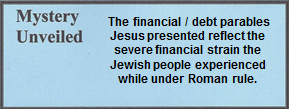
On a side note, parables were not used in the book of Acts or by early church fathers. Some poems, particularly from the writings of Paul, are said to have been used in early church hymns.[38]
< ——————————————– >
[1]. For a partial listing of false prophets and false messiahs, see Appendix 25: “False Prophets, Rebels, Significant Events, And Rebellions That Impacted The First Century Jewish World.”
[2]. This includes extra-biblical books, but is not limited to, the Pseudepigrapha and Nag Hammadi Gnostic Gospels.
[3]. Bivin and Blizzard, Understanding the Difficult Words. 43.
[4]. 1:1-13 = Column 1, lines 1-13; Martinez, The Dead Sea Scrolls Translated. 376.
[5]. The meaning of these names is unknown.
[6]. A common expression or formula used for the exorcism of demons. See Lk. 4:35; cf. Mk. 1:25, 5:8, and 9:25.
[7]. Phtha is the name of an Egyptian deity.
[8]. The phrase “A thing to be trembled at” has a similar reading in James 2:19.
[9]. The phrase “I adjure you” is another expression or formula to cast out a demon, but is always followed by the deity (God of the Hebrews, Jesus) who has the greater power and authority.
[10]. It is amazing that this Jewish exorcist referred to the “god of the Hebrews” as “Jesu” but failed to write out the full name of “Jesus.” Since a typical Jew would not use the name “Jesus,” the Jewish author abbreviated “Jesus” to “Jesu,” yet still acknowledged the deity of the Hebrews as being Christ.
[11]. Barrett, The New Testament Background. 34-37; See also Deissmann, Light from the Ancient East, 250-60.
[12]. Lang, Know the Words of Jesus. 190.
[13]. Witchcraft of any kind is strictly forbidden in the Bible. Deut. 18:10-11; Ex. 22:18; Lev. 20:27; 1 Sam. 28:9 and Isa. 2:6; See also Archer, “Crimes and Punishment.” 1:1031-32.
[14] For further study on binding and loosening see 08.06.03; 11.02.08; 10.01.29; 12.01.03 as well as an excellent resource by Foster and King, Binding and Loosening: Exercising Authority over Dark Powers.
[15]. Arnold, Powers of Darkness. 78.
[16]. For further study, see Clyde E. Billington. “Ancient Exorcists, Demons, and the Name of Jesus. Part 1. Artifax. Summer 2010. 15-21.
[17]. 4:1-14 = Column 4, lines 1-14; Martinez, The Dead Sea Scrolls Translated. 377. Words and letters within brackets are missing from the original text, but inserted by Martinez.
[18]. Charlesworth, The Old Testament Pseudepigrapha. 1:721.
[19]. Apocalypse of Elijah 3:6-10; esp. 3:12.
[20]. See additional comments on 10.01.29 “Bind on earth … loose on earth” and 11.02.09 on “Binding and Losing.”
[21]. Barclay, “Matthew.” 2:229.
[22]. Deissmann, Light from he Ancient East. 304; See additional comments on 10.01.29 “Bind on earth … loose on earth” and 11.02.09 on “Binding and Losing.”
[23]. Kydd, Healing. 21; Tertullian, Apology. 295, 297.
[24]. Arnold, Power and Magic. 15.
[25]. See Origen, Contra Celsum. 6.41; 7.4; Arnold, Power and Magic. 9.
[26]. cf. Eph. 1:21; Cor. 2:12-15; Phil. 2:9.
[27]. Metzger, Goldstein, and Ferguson. Great Events of Bible Times. 148.
[28]. See the “Parables of Jesus” Appendix 10.
[29]. See Appendix 10, The Parables of Jesus.
[30]. Lockyer, All the Parables of the Bible. 11-12.
[31]. The cultural meaning of righteousness has always been to hold the biblical code of ethics, such as giving to the poor or expressing kindness, especially in situations when it would not be expected. But Jesus introduced a new definition of righteousness – that is to have an ongoing relationship with God.
[32]. Lockyer, All the Parables of the Bible. 10-11.
[33]. Blomberg, “Parable.” 3:656; Lowry, “Parable.” 3:650-52.
[34]. The eight parables are the sower, the wheat and tares, the grain of mustard, the secret growth of a seed, the leaven, the hidden treasure, the pearl of great price, and the dragnet.
[35]. The sixteen parables are the two debtors, the two insolvent debtors, the good Samaritan, the three loaves, the rich man’s meditation, the watching householder, the barren fig tree, the marriage supper, the lost sheep, the lost piece of silver, the prodigal son, the unrighteous steward, the rich man and Lazarus, the importunate widow, the Pharisee and the tax collector, and the laborers in the vineyard.
[36]. Lk. 7:41; Mt. 18:23. See 02.03.03 “Economy” for a brief description of the condition of the economy during the ministry years of Jesus.
[37]. For further study of loans, debts, and how first century Jewish courts ruled, see the Mishnah and the chapter titled Baba Bathra.
[38]. Packer and Tenney, eds., Illustrated Manners and Customs. 378; See also Packer, Tenney, and White, eds., Nelson’s Illustrated Encyclopedia of Bible Facts.
08.04.08 Lk. 6:46; Mt. 7:24-27
WISE AND FOOLISH BUILDERS.
Lk. 46 “Why do you call Me ‘Lord, Lord,’ and don’t do the things I say?
Mt. 24 “Therefore, everyone who hears these words of Mine and acts on them will be like a sensible man who built his house on the rock.
25 The rain fell,
the rivers rose,
and the winds blew and pounded that house.
Yet it didn’t collapse,
because its foundation was on the rock.
26 But everyone who hears these words of Mine and doesn’t act on them will be like a foolish man who built his house on the sand.
27 The rain fell, the rivers rose
the rivers rose,
and the winds blew and pounded that house,
and it collapsed.
And its collapse was great![1]
“Lord, Lord.” In this passage Jesus again took on one of the names of God, Adonai, which means Master over Everything.[2] At issue is the fact that people honored Him with their lips but failed to do what was required for them. Therefore, Jesus connects words and faith with obedience. Furthermore, He identified Himself as the One who is in authority, in absolute rulership. To the Jewish listeners, the name Adonai, defined God as the One who was in absolute rule.[3]
Many parables are based on Old Testament stories and themes. For example, the two builders of Luke 6:46-49 is related to Isaiah 28:14-18.[4] The essential fact of the parable is whether a house has a secure foundation or just appears to have a foundation. The meaning of the parable is whether a person has a secure foundation in Christ or just appears to have a foundation. This Hebraic poem was written with two sets of three-step parallelisms.
There is dark alluvial sand in many areas around Galilee. It is unlike ordinary beige-colored sand which is found in a desert or along any seashore. The alluvial sand develops a firm hard surface in the dry summer months and appears to be solid ground, but obviously isn’t. In the winter when it rains or a nearby river floods, the alluvial sand will wash away like ordinary sand. But just a few feet below the sandy surface is firm bedrock. If one wanted to build a house, the builder would have to take the time and effort to dig through the sand and build upon the rock foundation.
When Jesus spoke of the “wise man who built his house on the rock,” he was not speaking of where to build, but how to build. The point of the story is to take the time and effort to build a strong house. Likewise, we are to take the time and effort to build a strong character – or foundation – in Christ. To the first century Jews, the interpretation was to see the rock as the Word of God and the sand as the teaching of the Pharisees.[5] It is noteworthy that Jesus said storms will come into everybody’s life, whether a believer or not. How one survives those storms is not only dependent upon one’s faith, but also upon how strong their spiritual foundation is. In essence, Jesus was teaching right living to His people and telling them to choose between death and life (cf. Deut. 30:15-20). He did this many other times as well, including at the end of His Sermon on the Mount. The Apostle Paul later made a reference to building a foundation upon the teaching of Christ (1 Cor. 3:10-15).
Ironically, Herod the Great, one of the supreme architects and builders of the ancient world, constructed an artificial harbor at the Mediterranean seaport city of Caesarea, a city that he also built. To create his harbor, it is believed that he took barges, filled them with hydraulic concrete powder,[6] floated them to the desired locations, and sank them. Sea water mixed with the powdered concrete, and artificial stones, or concrete blocks were created. However, during the following centuries, the concrete blocks continued to sink as a result of the shifting sand on the sea floor. After a few centuries, the harbor walls disappeared below the waterline.[7] Today the ancient harbor is little more than a point of interest for marine archaeologists.

08.04.08.A. BLACK BASALT SAND OF THE SEA OF GALILEE REGION. The black basalt sand (from volcanic rock) along the shoreline of the Sea of Galilee is not at all like ordinary sand. It is large and coarse and only a few feet below is solid bedrock. The gravely sand is shown in contrast with a United States quarter coin. Photograph by the author.
Houses were built between early spring and late fall, with the exception of the hot afternoons of August. Construction was not suitable in the winter when cold wet weather was the norm. A typical week in winter had two or three days of cool or cold cloudy weather followed by two or three days of rain, and the cycle repeated.[8] Now and then came a heavy storm. The key point Jesus taught was that a house with a foundation will survive the storms of life; a life with Jesus will survive the storms of life. Furthermore, His overall message was that now is the time to build the right foundation.
The “foundation” imagery of the messiah was not a new concept. The prophet Isaiah spoke of it and the local rabbis knew those words concerned the messiah. Note the messianic prophecy:
14 Therefore hear the word of the Lord, you mockers who rule this people in Jerusalem.
A 15 For you said, “We have cut a deal with Death, and we have made an agreement with Sheol; when the overwhelming scourge passes through, it will not touch us,
B because we have made falsehood our refuge and have hidden behind treachery.”
C 16 Therefore the Lord God said: “Look, I have laid a stone in Zion, a tested stone, a precious cornerstone, a sure foundation;
D the one who believes will be unshakable.
C’ 17 And I will make justice the measuring line and righteousness the mason’s level.”
B’ Hail will sweep away the false refuge, and water will flood your hiding place.
A’ 18 Your deal with Death will be dissolved, and your agreement with Sheol will not last. When the overwhelming scourge passes through, you will be trampled.
Isaiah 28:14-18
The message is simple: Just as the cornerstone was critical in building a secure building,[9] so Jesus is critical in building a secure life. A simplified illustration of Isaiah’s parable is as follows:
Section A refers to the covenant with death
Section B is a refuge (house?)
Section C is the divine building material (Jesus)
Line D is the focus of the parable; the inscription upon the believer
Section C’ refers to the use of the building material
Section B’ states that the refuge will be destroyed
Section A’ states that the covenant with death is annulled.
The similarities of the two parables are these: In essence, the foundation upon which a house or refuge (meaning one’s life) is built is Jesus. The hearing and doing is the extra effort equal to that of digging through the hard soil to uncover a solid rock. Both Isaiah and Jesus encouraged believers to hear the Word of the Lord, but Jesus also encouraged them to do His Word. Isaiah’s sections C and C’ refer to Jesus.
The rabbis believed that verse 16 clearly indicated that “the stone” is not an ordinary stone, but a Divine Being of some kind. They were convinced the “tested stone” and “sure foundation” could not be an “ordinary” person which is a reason why they rejected Jesus. To them, Jesus looked just like any other Jewish man; His divine qualities were not physical, but were revealed in His emotional, mental, and spiritual characteristics.
From the collection of the Dead Sea Scrolls is a scroll known as the Rule of the Community. Note the following phrase that has an incredible reference to this foundation:
In the Council of the [Essene][10] Community there shall be twelve men and three priests, perfectly versed in all that is revealed of the Law, whose works shall be truth, righteousness, justice, loving kindness, and humility …. When these are in Israel, it shall be that tried wall, that precious cornerstone, whose foundation shall neither rock nor sway in their place.
Dead Sea Scroll, The Community Rule[11]
The opinions of the Essenes were certainly not accepted or even known by most of the Jewish people, but they clearly believed in the “essential foundation” concept.
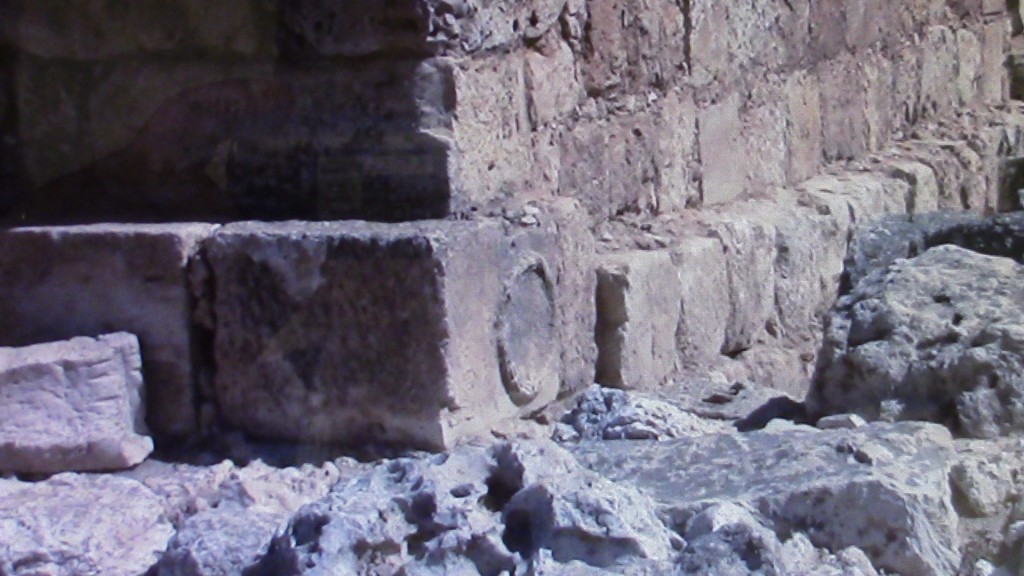
08.04.08.B SYNAGOGUE CORNERSTONE AT SHILO. The cornerstone was a foundation stone from which all measurements were taken for the construction of a new synagogue. As such, it was an ornamental dedication stone that, when laid, was accompanied with considerable celebration of the anticipated future of the new facility. Photo by Linda Landis.
[1]. Fleming, The Parables of Jesus. 58.
[2]. See Appendix 32 and Evans, Praying through the Names of God. 17-18.
[3]. See “Jesus, the Fulfiller of Selected Names of God” in Appendix 32 for additional attributes; Evans, Praying the Names of God. 17-18.
[4]. Three other examples of Jesus’ parables that are based upon Old Testament are as follows: 1) Luke 15:4-7 the parable of the Good shepherd is based on Psalm 23, 2), the prodigal son of Luke 15:11-32 is related to Jacob’s life in Gen. 27:1– 36:8 and 3) the Pharisee and tax collector of Luke 18:9-14 is related to the judgment and joyous restoration of Isaiah 66:1-6.
[5]. Pentecost, The Words and Works of Jesus Christ. (Video “B”).
[6]. While some scholars believe that hydraulic concrete was a Roman invention, others believe it was modified from hydraulic plaster that may have originated in the Aegean Sea area in the late second millennium B.C. by the Philistines.
[7]. See 03.05.27 and the “Construction of the Seaport City of Caesarea” for more information.
[8]. Israel has five distinct climate zones, therefore, the ideal time for construction varied from area to area.
[9]. See “Cornerstone” in Appendix 26.
[10]. Insert by the author of clarification.
[11]. Cited by Bailey, Jesus through Middle Eastern Eyes, 321 in Vermes, “The Community Rule.” in The Dead Sea Scrolls in English. 85.